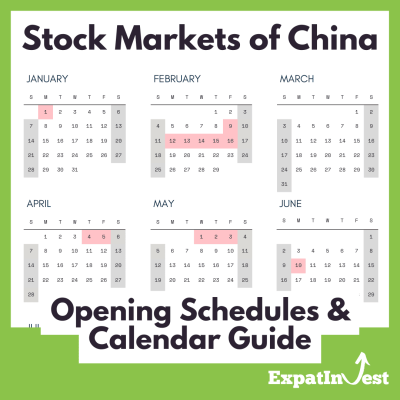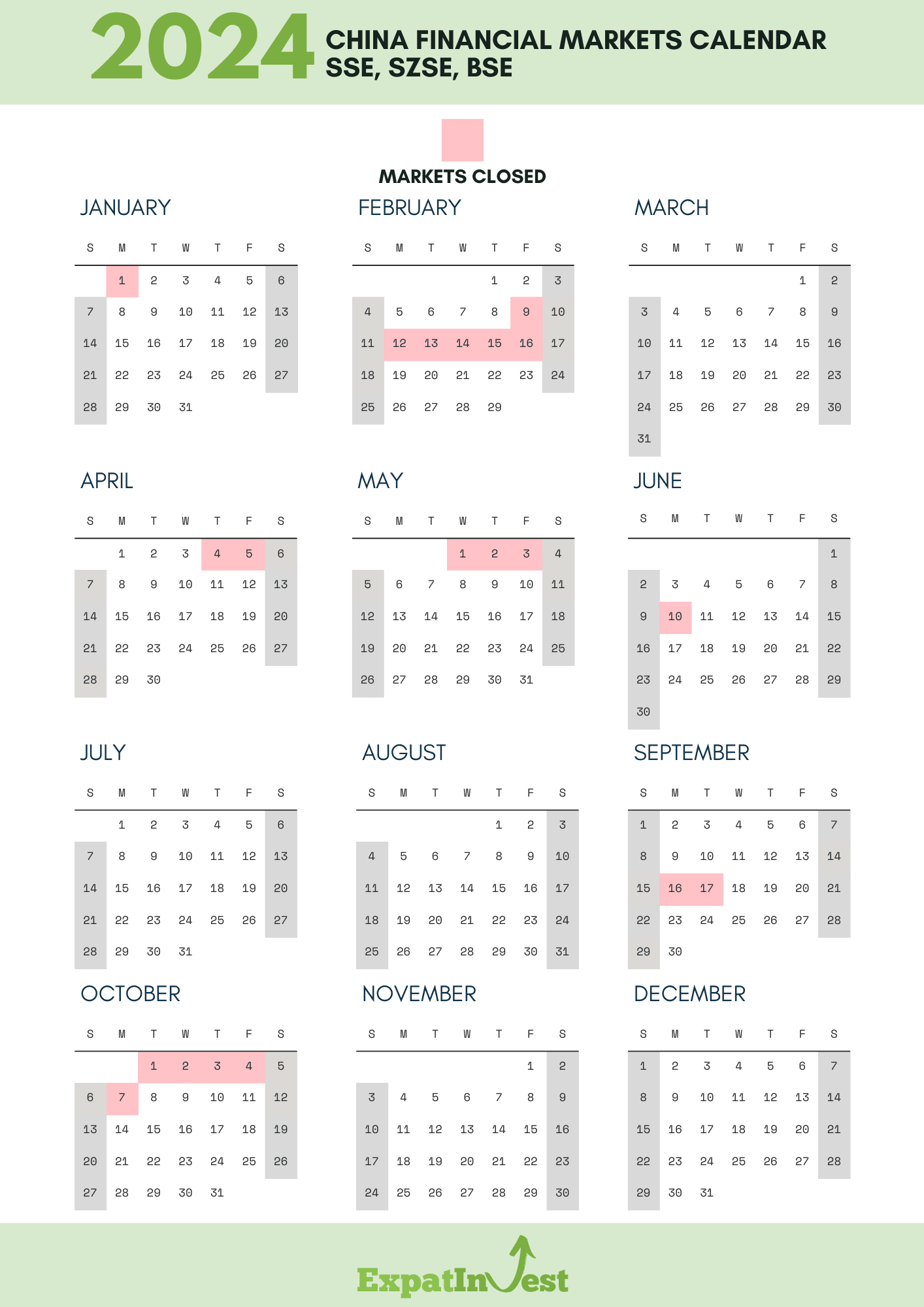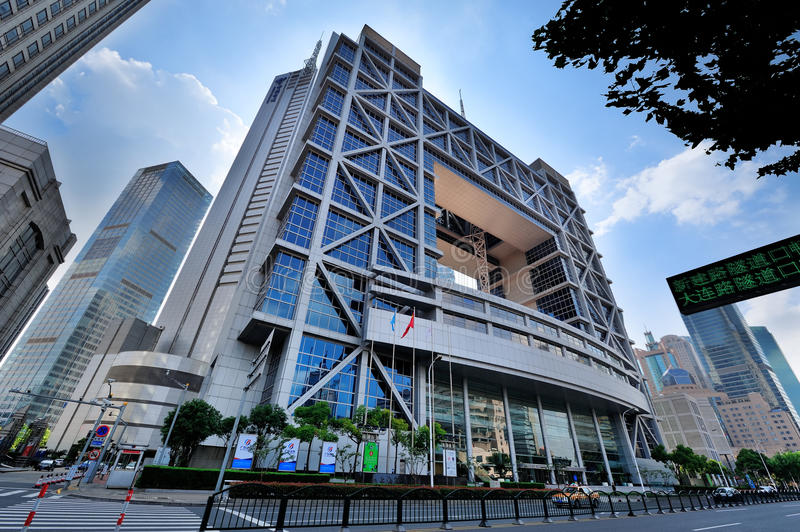
Today we’re looking to help the reader out with a clear, concise resource on the Calendar and Schedules for Chinese Stock Markets. All of our data is directly from the markets themselves, and resources are linked at the end of this article.
Table of Contents
Chinese Stock Markets Covered
We are covering China’s 3 primary mainland markets today. They all have the same schedule, governing body, and macro policies.
1) The Shanghai Stock Exchange (SSE)
– This includes the SSE START Market.
– Our full intro to the SSE.
2) The Shenzhen Stock Exchange (SZSE)
– This includes the CHINext Market.
– Our full intro to the SZSE.
3) The Beijing Stock Exchange (BSE)
– Our full intro to the BSE.
Opening Hours and Days
China’s main financial markets are open for trading Monday through Friday, with the exception of public holidays and other closing days declared by the Exchanges in advance.
The markets are open on weekdays from 9:30am-11:30am, and again from 1:00pm-2:57pm. China’s financial markets are some of the only ones in the world to include a mid-day lunch break!
- Why 2:57pm and not 3:00pm?
China’s markets have what is known as a ‘Closing Call Auction’ from 2:57pm-3:00pm. A call auction occurs over a set time when buyers set a maximum acceptable price to buy, and sellers set the minimum satisfactory price to sell a security on an exchange.
Holiday Schedule
As of 2024, the main Chinese financial markets have 7 holidays listed throughout the year.
- Some of the big Chinese holidays don't have exact dates. This is because China uses a lunisolar calendar.
China Stock Market Holidays:
1) New Year: The markets will close on January 1st if it is a weekday. The markets have historically closed for one day if January 1st falls on the weekend.
Example: In 2023, January 1st was on a Sunday. The markets closed for holiday on Monday, January 2nd instead.
2) Spring Festival (Chinese New Year): The Chinese markets historically close for 5-6 weekdays around CNY. This holiday is based on the Chinese lunisolar calendar and so the exact dates for this are different every year. It falls sometime from mid-January until late February.
So far, China’s special working days have not been added as open market days.
Example: In China’s 2024 working holiday schedule, The Spring Festival calls for 2 ‘special working days’ on weekend days surrounding the holiday. Chinese stock markets were not open on these special working days.
3) Qingming Festival (Tomb Sweeping day): The markets close for 1-2 business days every year for this holiday.
- Qingming falls on the 15th day after the March Equinox, which is either April 4th or 5th.
- While China’s working calendar usually adds a Special Working Day for this holiday, the financial markets historically do not.
4) Labor Day: The official date for Chinese Labor Day is May 1st. This holiday has been extended over the years to encourage domestic travel and consumption. The standard is 3 weekdays off, and 2 special weekend working days added. Luckily for finance workers, the markets are also closed on the 3 weekdays, but do not open up for the special weekend work days.
Example: In China’s 2024 working holiday schedule, the Labor Day holiday calls for 2 ‘special working days’ on weekend days surrounding the holiday – April 28th (Sunday) and May 11th (Saturday). China’s financial markets were not open on these special working days.
5) Dragon Boat Festival: This holiday is also on the lunisolar calendar and falls in late May or Early June. The market standard here is 1 day off, and no special working days added. In 2024, for example, the markets are closed for one day on Monday June 10th.
6) Mid-Autumn Festival: Again we have a lunisolar holiday, and this one falls somewhere between September and Early October. The markets historically close for 1-2 days, depending on the days of the week the festival falls that year.
Example: In China’s 2024 working holiday schedule, the markets will close on September 16th (Monday) and September 17th (Tuesday) and resume trading on September 18th (Wednesday). The Labor Day calls for one ‘special working day’ on a weekend day surrounding the holiday – Saturday September 14th. China’s financial markets are not open on this special working day.
7) National Day: The stretch of this holiday is from October 1st-7th. Chinese stock markets traditionally close down during this entire 7-day stretch and, once again, do not open up during the (usualy 2) special working days surrounding the holiday.
Standard Example, 2024: The market will close from October 1st (Tuesday) to October 7th (Monday) and resume trading on October 8th (Tuesday).
China's Stock Markets and 'Special Working Days'
Every year around October, Beijing announces the working holiday schedule for the upcoming year. Like most countries, it covers a calendar for all public holidays. Unlike most, it contains many ‘special working days’. These are weekend days that convert to normal workdays, usually to make up for time technically lost over longer holidays.
Here’s the holiday schedule announcement page: Gov.cn
And an article covering these special working days in more detail: What are ‘Special working Days’ in China?
Historically, China’s financial markets do not open during the ‘special working days’ announced by Beijing.
2024 China Stock Markets Calendar
A nice and simple calendar resource marking the market closings in 2024!
Resources & Further Reading:
- Shanghai Stock Exchange website: http://english.sse.com.cn/start/trading/schedule/
- Shenzhen Stock Exchange website: https://www.szse.cn/English/about/overview/index.html
- Beijing Stock Exchange website: https://www.bse.cn/disclosure/tradingtips.html
- Investopedia: https://www.investopedia.com/ask/answers/040115/when-do-stock-market-exchanges-close.asp








